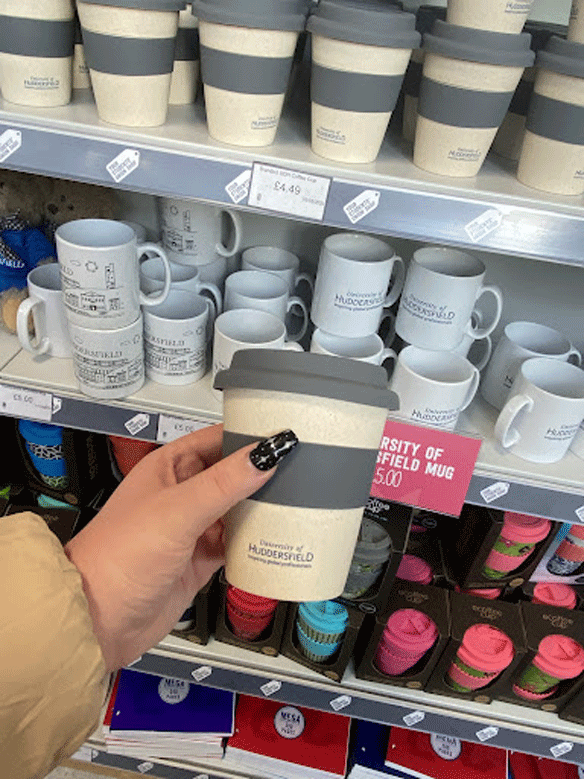
Responsible consumption and production 2024
Operations
The University of Huddersfield spends c. £50m through Procurement Services each year, and makes a commitment to being exemplars of best practice when it comes to Sustainability and Corporate Social Responsibility
In food and drink, the cafe in the Sovereign Design House offers a service where the use of disposables is reduced to a minimum. In-house food and drink beverages are only served on crockery, while take-outs are strongly encouraged to bring their own reusable mugs or containers. We have successfully replaced all plastic disposable take away, salad and hospitality boxes with biodegradable alternatives.
We have increased our crockery provision across campus and have introduced a 15p charge for a disposable cup. This initiative was launched in September 2022 and has had a dramatic positive impact. Before the 15p charge was implemented, 2% of hot drinks were sold in reusable cups; since implementation of the charge and an increased provision of crockery 32% of hot drinks are now sold in reusable cups.
All takeaway containers purchased by the catering department in the 23/24 academic year were compostable or recyclable, and we meet regularly with suppliers to review the sustainability of our disposable products. We replaced plastic cutlery with a birchwood alternative in April 2023 ahead of the single-use plastics ban implemented in October 2023: in the 23/24 academic year 101,000 birchwood cutlery items replaced plastic ones. At three of our outlets, we promote the use of reusable metal cutlery to our dine-in customers.

Vegetarian / Vegan options:
Our Vegan and Vegetarian Eco Eats outlet provides two dishes each day for £1.99 each. One dish is vegetarian and one is vegan. Eco Eats was introduced to support students and staff to be able to purchase a high-value, freshly prepared, and nutritionally balanced hot meal during the cost of living crisis. Between September 2023 and May 2024 3386 vegan and 2097 vegetarian £1.99 meals were purchased by university staff and students.
As part of our ongoing menu development we are committed to expanding our range of plant-based menu options. We offer a range of plant-based options throughout each of our eight catering outlets and on our hospitality menu.
As part of our commitment to the Platinum WELL Standard our Head Chef Tom led a vegan cookery demo, this was designed to support campus users to create nutritious, sustainable meals using affordable ingredients. Attendees received a recipe and spice pack to enable them to recreate the dish at home.
We continue to be recognised by PETA as one of the recognised as one of the most vegan friendly universities in the UK.
Dairy alternatives:
In September 2022 we stopped charging for non-dairy milk alternatives for a number of reasons:
- To ensure that customers with food hypersensitivities and vegans are able to purchase beverage products for the same price as those that can consume dairy
- The carbon emissions associated with almond, oat and soy milk are less than a third of those generated by dairy milk, therefore we support the movement towards dairy alternatives.
- Mintel data demonstrates that 33% of 16–24 year olds, our core demographic, are choosing plant-based milks over dairy.
This change has been very well received and we are continuing to see growth in the number of hot beverage products made non-dairy milk options.
We ethically source and conscientiously purchase food and materials related to its provision on campus. We will certify to welfare and sourcing standards, and actively encourage local food production where possible. More specifically, we ensure that our fresh meat is Red Tractor assured, our fish is MSC certified, our eggs are free-range and our coffee is ethically sourced and certified.
Locally Sourced:
All of our fresh produce (dairy/sandwiches/fish/meat/fruit and veg, freshly made cakes) is sourced from within a 40-mile radius of the University campus. We now able to utilise produce such as fruit, veg and herbs that have been grown on our campus in dishes served in our busy central refectory.
Further afield:
All of our frozen and ambient products (around 60% of catering spend) are sourced through the local (Huddersfield-based) supplier Total Foods. Whilst this does not guarantee local supply, streamlining this range of products reduces the number of deliveries required to campus and therefore the associated CO2 emissions.
Coffee
We sell two coffee brands across campus, Starbucks and Matthew Algie. Both have significant environmental commitments including sustainable sourcing, reduction of single-use plastic and the expansion of plant-based drink options. Matthew Algie coffee, sold in four of our six coffee-led outlets, is triple certified, approved by the Fairtrade Foundation, Rainforest Alliance and Organic Food Federation.
Waste
In late 2022 we partnered with Too Good To Go, since implementation we have saved 606 meals (202 Magic Bags) from being wasted through selling these at a heavily discounted price to our students.
The success of the waste recycling stations across all our food outlets has continued to encourage students and staff to segregate their catering waste further increasing recyclable waste, demonstrated in the encouraging recycling figures in 2023/24 of 49%. This initiative has also encouraged further awareness of segregation, particularly for international students who have been able to educate themselves when using the recycling stations which have five segregated waste options with clear information.
We partner with ReFood to divert our food waste to a South Yorkshire anaerobic digestion facility. During the 2023/24 academic year there has been a monthly average of 1,690kg of food waste diverted from incineration. This Food Waste has the potential to generate 2647 kwh of electricity and 3 tonnes of fertilizer. Our coffee outlets segregate all coffee ground waste which is then collected by our grounds maintenance team for use as rich fertiliser for our biodiverse campus. In 2023/24 12.53 tonnes of coffee-ground waste was reused as fertiliser.